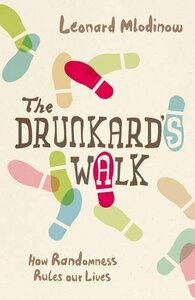You need to sign in or sign up before continuing.
Take a photo of a barcode or cover
Vague memory: enjoyed it, mostly. Some interesting tidbits on the nature of randomness and human beings' instincts for creating patterns out of nothing. I don't think I finished it, and had to return it to the library. Might want to read again sometime.
informative
slow-paced
A great book for better understanding statistics, and understanding when, where, and why our first instincts and perceptions about statistics are often misguided to flat-out wrong. As data and large numbers become even more an inescapable feature on the landscapes of business, science, technology and more, it's important to understand it all well enough to see the difference between patterns and random noise.
informative
relaxing
fast-paced
This was a fascinating book about the rules of randomness and disorder and how they affect our lives. I really enjoyed the logic problems presented and then explained by the author, as well as all of the history of great philosophers, mathematicians, and statisticians. A great read for anyone who likes logic or stats.
the narration was good but the content did nothing for me
I quite enjoyed this book, although the majority of the book seems more like a history of statistics than a view of probability. Only the final few chapters really live up to the title, but the earlier chapters are kinda necessary to ensure the reader has a grasp of the subject.
The information is presented very clearly - more clearly than the stats papers I did - and the authors style with it's personal touches and bits of humour make it an easy read. The book is surprisingly light on jargon and makes use of familiar examples to make it's point.
It reminds me a little of Freakonomics, but feels more friendly and relevant than the former.
The information is presented very clearly - more clearly than the stats papers I did - and the authors style with it's personal touches and bits of humour make it an easy read. The book is surprisingly light on jargon and makes use of familiar examples to make it's point.
It reminds me a little of Freakonomics, but feels more friendly and relevant than the former.
hopeful
informative
inspiring
reflective
medium-paced
this is a amazing book about the reduction to the mean, outliers, and norms, without changing its essential nature, the randomness within a certain system are just that. one needs to have more number of tried over a long period of time to caculate one's essence. soat the end, he gives us a few examples of people who eventially got their lucky break by doing it enough times,
challenging
informative
reflective
slow-paced
If you don't know much about probability but have some interest this book will be a good one for you. However if you are already aware of a lot of the concepts and come from a mathematics background I wouldn't recommend it. Unfortunately I found very little new in this book beyond specifics of names and dates which makes it like reading a reference textbook for me. It's not the fault of the book, it just seems I was not the target audience for this book.


